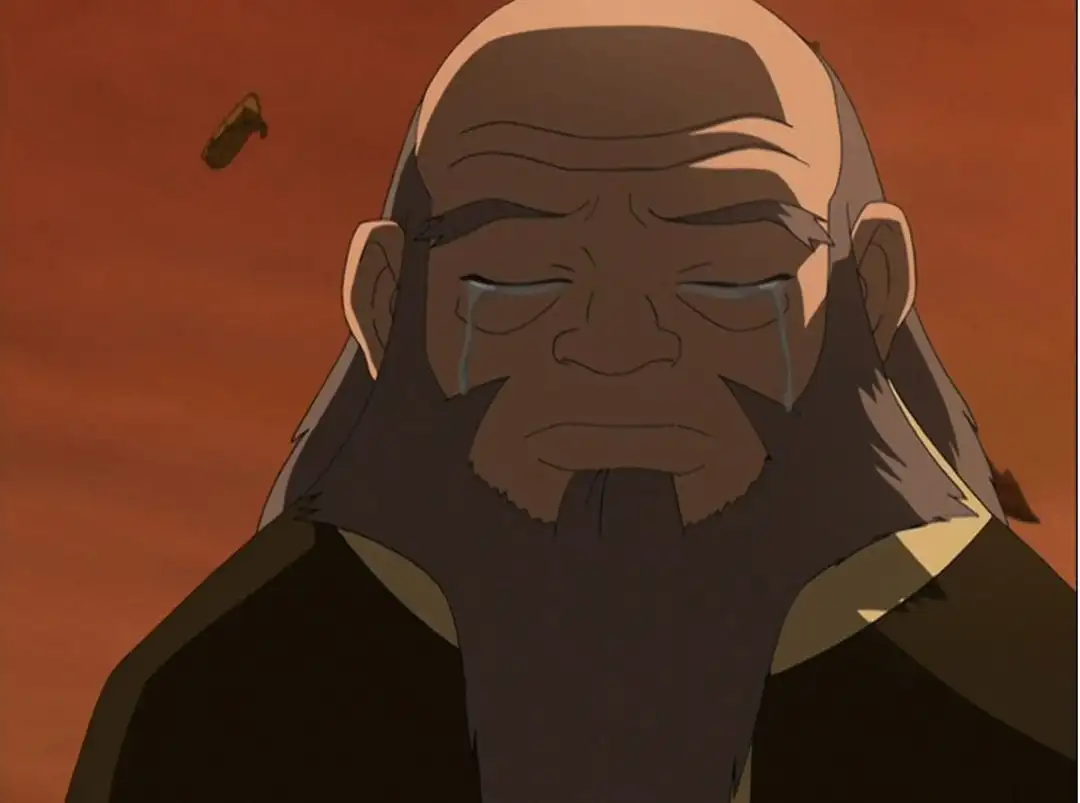The image of an old man drinking tea is one as old as the drink itself. There’s a serenity to it: someone alone with their thoughts, contemplating that which we may never know. When I think of Iroh from Avatar: The Last Airbender, that’s the image I picture.
For those uninitiated, the world of Avatar is focused on the four elements: water, earth, fire, and air. Civilizations are built around them and some people called “benders” have the ability to control one of these elements. Every episode opens with a brief history to catch up new viewers and to remind the old: “Long ago, the four nations lived together in harmony. Then everything changed when the Fire Nation attacked.”
Iroh is a firebender, a disillusioned general from the Fire Nation. When we meet Iroh, he is drinking tea while his nephew, the banished Prince Zuko, is freaking out about something in the distance. Iroh continues to drink his tea, seemingly without a care in the world. The duo are the primary villains for much of the series, with the hotheaded Zuko balanced by Iroh, the comic relief.
Iroh is framed as a passive old man in the show’s early episodes. He rarely joins the fight and when he does, he seemingly doesn’t care who wins. But Iroh was always something more; a character not defined by villainy but by a deeper understanding of his place in the world.

Iroh taught me how to be a man.
At first, it’s hard to see Iroh as a role model for anything. He is a bumbling old man trying to stop the heroes at every turn. So why does the character hold such resonance for me?
It comes down to the fact that he really isn’t the kind of man you often see in American media. Our go-to role models as men are the emotionally repressed tough guys that grumble or joke through everything like Clint Eastwood, Bruce Willis, or Chris Pratt. They are textbook examples of a pervasive kind of toxic masculinity. They fight, they never attach to anything, and they get women as a reward.
Iroh is none of those things. He is strong, but unwilling to let rage enter his body. He is well spoken, willing to sit down with strangers to discuss life over a cup of ginseng tea. He is willing to accept failure and learn from it. He cares more about being moral than allegiance to his nation. He is sincere in his passions, and finds joy in the smallest things.

Iroh is masculine, but not toxic.
The most emblematic display of Iroh’s greatness is his segment in the episode “Tales of Ba Sing Se,” which shares a series of stories from the perspective of different characters.
For context, Ba Sing Se is the capital of the Earth Kingdom, the Fire Nation’s primary enemy. Iroh and Zuko are hiding there pretending to be citizens. Early in Iroh’s section, he comforts a small crying child by singing a simple song about a soldier. As Iroh plucks away at his instrument, the boy stops crying and starts smiling, pulling on Iroh’s beard. That is all the child wanted: to be happy. So Iroh obliges and laughs with him. He’s not angry, despite being in visible discomfort. Iroh is just happy that this stranger’s day was brightened because of what he did. That happiness is sincere.
Later, he is stopped in an alley by a mugger. The man is threatening him with a dagger. Does Iroh use his firebending to stop the man? No. Does Iroh give the man his things? Also no. Instead, Iroh helps the man who is clearly not a seasoned criminal or fighter. He gives him a lesson on proper battle stance and then pours him a cup of tea.

The man who shoved a dagger in Iroh’s face seconds earlier sits down with him, and they talk. As it turns out, the man wanted to be a masseuse. Iroh gives him the confidence to turn his life around.
This is one of the greatest parts of Iroh’s character: he sees the best possible version of everyone he meets, and with utter sincerity helps them gain the self confidence to become that person. Throughout the series, Iroh does this with allies and enemies alike, seemingly out of the kindness of his heart. Is Iroh any less of a man because of this? Of course not. In fact, Iroh is more of a man.
At the end of the scene, we reach the culmination of these moments. The sun is setting, and Iroh is at the top of hill, under a tree. He lights some incense and puts up a picture of his son, who died in the war between the Fire Nation and Earth Kingdom. Iroh begins to openly weep and starts to sing, and the song’s words are etched into my mind.
Leaves from the vine
Falling so slow
Like fragile tiny shells
Drifting in the foam
Little soldier boy
Come marching home
Brave soldier boy
Comes marching home
Iroh wasn’t always the man we see. He was a near sociopathic general for the Fire Nation. But the death of his son and disillusion with his nation made Iroh someone new. We may not entirely know why, but Iroh changed. He became a better man.
In the end, I believe this is the greatest lesson men young and old can take away from Iroh. Change isn’t weakness, and often changing who we are can be the strongest action we can take. To strive to be the best version of ourselves is something we can all do, and Iroh is the only masculine character I know that helped me realize this fundamental truth.
We need more Irohs in this world. We need men who are sincere in their love and hopeful in their outlook, or even just men who are willing to sit down and enjoy a cup of tea with a fascinating stranger.





Published: Dec 28, 2018 09:00 am